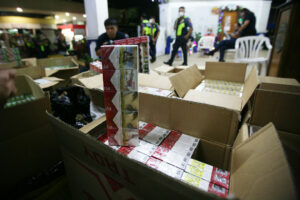By Kenneth Christiane L. Basilio
THE Philippine government lost P25.5 billion in taxes from tobacco smuggling last year, according to the Bureau of Internal Revenue (BIR), as it sought to intensify its enforcement of tax compliance on the tobacco industry.
While the preferential shift of Filipinos to vape products increased “by a hundred percent,” it is not enough to compensate excise tax revenue losses from illicit tobacco trade, the BIR said.
“[Illegal tobacco] trade has greatly affected our collection on excise taxes on tobacco products,” Venus T. Gaticales, BIR Excise Large Taxpayers Field Operations Division chief, told reporters on the sidelines of a forum. “For last year, [the] collection [for] 2023, compared to 2022 collection, there is a decrease of about P25.5 billion or 15.91%.”
“The contributions of the excise tax on vapor products, although it almost increased by 100%, it is not enough to compensate the decrease as far as the cigarette excise tax collection is concerned,” she added.
The Philippines applies an excise tax rate of P60 per pack of 20 cigarettes while vape products are levied with a P54.60 per milliliter (mL) tax for salt nicotine and P63 per 10 mL tax for classic nicotine products, according to the excise tax rates prescribed by the Bureau of Customs for 2024.
While the government also incurs losses in vapor products, its foregone revenues do not “run in a billion compared to cigarettes,” Ms. Gaticales said.
The illicit trade of tobacco products not only harms government revenues but also public health as 50% of excise tax collections from tobacco products are allocated to fund the country’s universal healthcare program as well as support the local tobacco industry.
Illicit tobacco trade refers to the counterfeit production or smuggling of cigarette or vapor products into the country without undergoing proper trade avenues.
For 2024, the BIR is targeting to collect P324.56 billion in excise tax collections, with tobacco products pegged to contribute P152.4 billion this year, according to a memorandum by the tax collection department.
The tobacco industry has contributed around P46.69 billion to the country’s total excise tax collections as of April 2024, said Ms. Gaticales during her presentation.
To combat illicit tobacco trade, she said the BIR and Department of Trade and Industry (DTI) affix trade revenue stamps on tobacco products, allowing the government to distinguish between legitimate and smuggled cigarette and vapor products.
The government is also looking at addressing smuggled and unregistered vapor products, DTI Assistant Secretary Amanda Marie F. Nograles said.
“By June 2024, we will have the mandatory product registration that immediately plugs the faucet,” she said during the forum.
“We’ll be able to check whoever is not registered, whoever is not certified, then they can no longer enter our market. By January 2025, we’ll have a market clearing process. Then we will remove all vape [products] that’s not registered.”
The BIR seeks to strengthen its monitoring of the tobacco supply chain to reduce illegal cigarettes in the market, said Ms. Gaticales.
“These requirements include submission of a sworn statement of the volume of sales and removals as well as information on, among others, the product brand names, price, and the regions where the brands are distributed,” she said.
Meanwhile, the BIR in a separate statement said it seized 347,869 packs of illicit cigarettes worth P219.2 million in tax liabilities after conducting raids in several areas in Agusan del Sur and Surigao del Sur last April.
“Residential houses are now being used as warehouses by traders of illicit cigarettes. If you see any signs of illicit cigarettes or vape products in your neighborhood, report the same to the BIR. Illicit trade destroys legitimate businesses,” Commissioner Romeo D. Lumagui, Jr. said.
The government should leverage its existing tax regulations and anti-smuggling laws to mitigate losses due to illicit tobacco trade before increasing excise taxes on these products, Rizal Commercial Banking Corp. Chief Economist Michael L. Ricafort said in a Viber message.
“(The government should) run after tax evaders, anti-smuggling campaign, alongside more disciplined spending to prevent leakages, wastage, and anti-corruption,” he said.
Ms. Gaticales urged the government to strengthen its border control operations to prevent the entry of smuggled tobacco goods into the country.
“Being an archipelagic country, with approximately 7,641 islands and a coastline that is fifth longest in the world… makes it difficult to monitor or control the transportation of illicit [tobacco products],” she said. “For this reason, the Philippine government needs to improve border defenses and tax administration to control the illegal trade of cigarettes.”
Policing the country’s borders to prevent tobacco smuggling “is a question of good governance,” Ser Percival K. Peña-Reyes, director of the Ateneo Center for Economic Research and Development, said in a Viber message.
The government should properly incentivize authorities tasked to monitor the country’s borders, he added. “Those who are tasked to police these activities, are they incentivized enough to carry out their job faithfully?”
Filomeno S. Sta. Ana, III, coordinator of Action for Economic Reforms, said deterring illicit tobacco trade requires a “whole-of-society approach.”
Congress should also strengthen House Bill No. 10329, a proposed measure seeking to strengthen regulation and penalties for the tobacco industry.
“The substitute bill, however, needs to be strengthened. The substitute bill omits citizens’ participation in monitoring illicit trade and is silent on conflict of interest issues,” he said. — with inputs from L.M.J.C.Jocson
